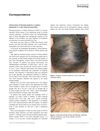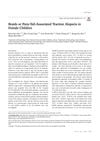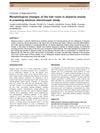29 citations,
February 2019 in “Pediatric dermatology” Trichotillomania shows specific signs like black dots and uneven hair lengths but lacks certain features of alopecia areata.
June 2020 in “Journal of Drugs in Dermatology” Frontal fibrosing alopecia can be misdiagnosed as androgenetic alopecia in African American women.
1 citations,
January 2018 in “Indian dermatology online journal” The girl has both monilethrix and Type 1 diabetes, but no link between the two conditions is known.
December 2021 in “Faculty Opinions – Post-Publication Peer Review of the Biomedical Literature”  June 2024 in “Sohag Medical Journal”
June 2024 in “Sohag Medical Journal” Vitamin D is linked to hair health, but more research is needed for its use in treating female hair loss.
 7 citations,
July 2017 in “Australasian Journal of Dermatology”
7 citations,
July 2017 in “Australasian Journal of Dermatology” Reflectance confocal microscopy is useful for diagnosing scalp melanomas, which have features similar to those on the trunk.
4 citations,
June 2017 in “Annales de dermatologie et de vénéréologie” The study found that a specific type of hair loss is increasingly common in premenopausal women and can be effectively diagnosed and treated with various medications.
 March 2023 in “Journal of skin and stem cell”
March 2023 in “Journal of skin and stem cell” Trichoscopy is a good, quick, non-invasive way to diagnose different types of hair loss.
11 citations,
May 2022 in “JEADV. Journal of the European Academy of Dermatology and Venereology/Journal of the European Academy of Dermatology and Venereology” Most cutaneous adnexal tumors examined were benign and resembled common skin tumors.
January 2021 in “Indian dermatology online journal” The document lists various skin conditions and structures named "corona" that are not related to the coronavirus.
 16 citations,
February 2018 in “Journal of Cosmetic Dermatology”
16 citations,
February 2018 in “Journal of Cosmetic Dermatology” Carboxytherapy may help increase hair growth in alopecia patients but requires ongoing treatment.
 April 2016 in “Journal of the American Academy of Dermatology”
April 2016 in “Journal of the American Academy of Dermatology” Dermoscopy helped correctly diagnose a skin condition that was previously misidentified as a different hair loss disease.
 January 2019 in “International Journal of Trichology”
January 2019 in “International Journal of Trichology” A woman lost all her hair in one day, was diagnosed with a rare type of hair loss, and regrew it in 12 weeks with treatment.
4 citations,
September 2020 in “The journal of pediatrics/The Journal of pediatrics” A boy with monilethrix has brittle hair that breaks easily due to a genetic condition, which might improve by puberty.
 13 citations,
January 2018 in “International Journal of Dermatology”
13 citations,
January 2018 in “International Journal of Dermatology” The study found that treatment improved hair condition in patients with Fibrosing Alopecia in a Pattern Distribution in Chile.
 26 citations,
July 2019 in “Dermatology and Therapy”
26 citations,
July 2019 in “Dermatology and Therapy” The conclusion is that genetic testing is important for diagnosing and treating various genetic hair disorders.
 12 citations,
January 2014 in “Menoufia Medical Journal”
12 citations,
January 2014 in “Menoufia Medical Journal” Dermoscopy improves diagnosis of hair and scalp disorders and can help avoid unnecessary biopsies.
 2 citations,
March 2020 in “PubMed”
2 citations,
March 2020 in “PubMed” Biotin deficiency is not a major cause of Telogen Effluvium hair loss.
 July 2024 in “Dermatology Practical & Conceptual”
July 2024 in “Dermatology Practical & Conceptual” LC-OCT helps accurately diagnose different types of infant hair loss without invasive methods.
 4 citations,
January 2019 in “Annals of dermatology/Annals of Dermatology”
4 citations,
January 2019 in “Annals of dermatology/Annals of Dermatology” Changing hairstyles can help hair regrow in children with hair loss from tight braids or ponytails.
 January 2025 in “Journal of Fungi”
January 2025 in “Journal of Fungi” Advanced dermoscopy techniques improve diagnosis and treatment monitoring for Kerion celsi but don't guarantee full hair regrowth.
 6 citations,
January 2015 in “Dermatology”
6 citations,
January 2015 in “Dermatology” Trichoscopy helps diagnose hair and scalp problems but isn't always definitive and should be used with other methods.
 96 citations,
January 2013 in “International Journal of Trichology”
96 citations,
January 2013 in “International Journal of Trichology” Trichoscopy is a useful, non-invasive way to diagnose different types of hair loss.
 December 2023 in “Clinical, cosmetic and investigational dermatology”
December 2023 in “Clinical, cosmetic and investigational dermatology” The new method combining dermoscopy and Reflectance Confocal Microscopy is more effective for evaluating vitiligo.
 14 citations,
February 2017 in “Anais brasileiros de dermatologia/Anais Brasileiros de Dermatologia”
14 citations,
February 2017 in “Anais brasileiros de dermatologia/Anais Brasileiros de Dermatologia” Trichotillomania is often misdiagnosed as alopecia areata and can be treated effectively with N-acetylcysteine and psychotropic drugs.
2 citations,
January 2022 in “Indian dermatology online journal” Dermoscopy may not show hookworms clearly, and comparing it with tissue studies could improve diagnosis accuracy for skin conditions caused by parasites.
 March 2012 in “Journal of The American Academy of Dermatology”
March 2012 in “Journal of The American Academy of Dermatology” Dermoscopy helps diagnose different hair loss conditions, and characteristics vary among ethnicities and individual cases.
 April 2012 in “Journal of the American Academy of Dermatology”
April 2012 in “Journal of the American Academy of Dermatology” Dermoscopy can help diagnose tinea capitis in children by looking for comma hairs, black dots, and broken hairs with white bands.
3 citations,
January 2020 in “International journal of trichology” Congenital triangular alopecia is a hair loss condition present from birth or early childhood with no effective treatment needed.
 3 citations,
December 2013 in “Journal of Dermatology”
3 citations,
December 2013 in “Journal of Dermatology” Scanning electron microscopy revealed four distinct hair root shapes in alopecia areata, suggesting a less invasive diagnostic method.



















